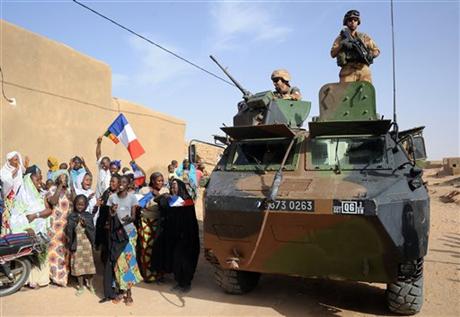
From Anne Jolis, Wall Street Journal: The French say we’re stopping for lunch. But after 90 minutes on the side of the road in North Mali’s badlands, it’s clear that even the French army doesn’t need this long to eat, smoke and digest.
Turns out one of their Nexter/Renault infantry-fighting vehicles has broken down. The 70-odd trucks and IFVs in our convoy now line the savanna while a mechanic tends to the breakdown. The soldiers of the 92nd Infantry Regiment munch on canned goat’s cheese, rabbit terrine, nougat and black chocolate. French logistical gear may not be ideal, but their rations are second to none. Welcome to war, à la Française.
The soldiers joke privately about run-down equipment and not enough of it. Even the car trouble, though, prompts a sideways pride. "Yeah, you Americans, you have all the fancy equipment," one young corporal says, leaning against his Renault six-wheeler with a cigarette and a smirk. "But we French, we figure it out every time—we know how to get by. . . ."
Politicians in Paris are still speaking as though Mali can be won on the cheap and quick—a drawdown in March from the 4,000 French troops here now, and a pullout after hypothetical elections in July. At that point, a trained-up Malian army and other African forces will theoretically handle the country’s security.
Except now that the insurgency has shown its face, with roadside IEDs and suicide bombings, and local supporters sheltering jihadists in key towns such as Gao, none of the French seriously expect their intervention to last less than a year. Even Capt. Benoit points out that they’re nowhere near training Malian forces. . . .
"I’m not worried about it—it will take as long as it takes," Capt. Benoit says of the hazy timeline. But he’s also quite sure that even after France "leaves" Mali, it won’t, in fact, leave. "We’ll continue to help them, in one way or another." He hopes so, anyway—just as he hopes that, after 2014, Afghanistan receives the help it will need from NATO to maintain any semblance of security. . . .
For the French back home and the West in general, he says, his "ideal" would be that "everybody realize that we can’t just let Africa fall" to jihadists. Again drawing the Afghan comparison, he says that in Mali, too, "we came to fight terror here so they don’t come to France. It’s the same thing."
But there’s also no resisting the humanitarian draw. "We’re sensitive that as we fight terror, the populations here wind up living better. They applaud us in the streets. We’re not immune to that," the captain says. "We have the impression that we’re the liberators of the country, like America in France in 1944. It’s a great thing."
If he had one message for Americans today, war-weary and broke as we are, it would simply be "Support freedom." He says it in painstaking English, it’s that important. "You already support freedom, but—continue."
Miss Jolis is an editorial page writer for The Wall Street Journal Europe. (photo: Pascal Guyot/AP)
Image: ap%202%2020%2013%20France%20Mali.jpg
